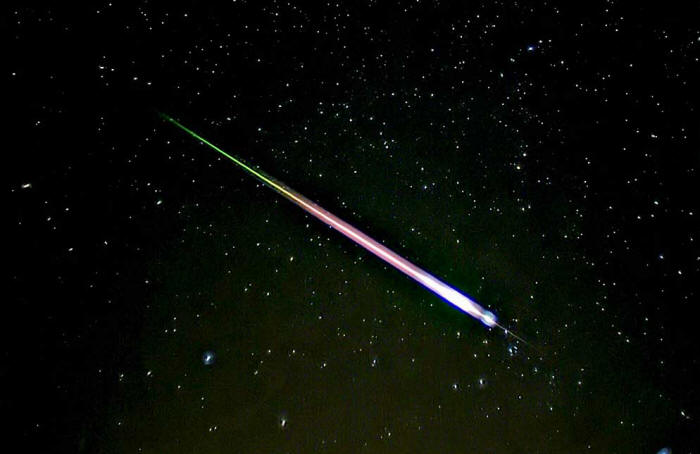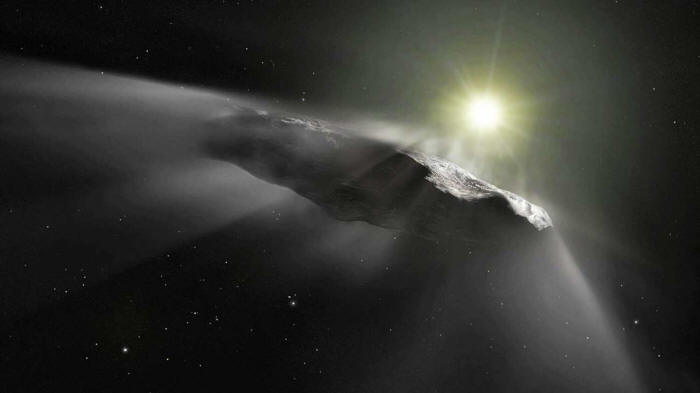|
The letter referred to
the probabilistic nature of Quantum Mechanics but it can also be
interpreted more broadly as if nature does not make random choices.
Weather was perceived this way before satellite and ground-based data allowed modern science to make weather forecasts a week in advance.
As an advanced scientific
civilization, the fundamental insight we learned is that we should
be guided by evidence rather than prejudice. As often imagined in
mathematics or science fiction stories, the range of possibilities
is far greater and sometimes has no overlap with what is actually
realized in nature.
The meteor detection on January 8, 2014, predated the first reported interstellar object, 'Oumuamua (Extraterrestrial - The First Sign of Intelligent Life Beyond Earth), by almost four years and should be recognized as the first interstellar object ever discovered.
The meteor paper was initially doubted because the uncertainties in the velocity measurements were classified.
The release of the confirmation letter is a watershed moment in which the government assists scientific progress by confirming the interstellar origin of this so-called CNEOS-2014-01-08 meteor at the 99.999% confidence.
Our discovery of an interstellar meteor heralds a new research frontier, in which the Earth serves as a fishing net for massive interstellar objects.
As a result of encountering Earth and rubbing against its atmosphere, an interstellar object burns up in a bright fireball.
This fireball is detectable by satellites or ground-based sensors even for relatively small interstellar objects like CNEOS-2014-01-08, which was about a meter in size and created a fireball carrying a percent of the energy of the Hiroshima bomb.
This size scale is a hundred times smaller than 'Oumuamua, which was discovered by the Pan-STARRS telescope through its reflection of sunlight.
This alternative detection method allows existing survey telescopes to discover only objects larger than a football field, within the orbit of the Earth around the Sun.
This artist's impression shows the first interstellar object ‘Oumuamua discovered in 2017 (Credit: European Space Agency)
There should be a million objects as small as CNEOS-2014-01-08 within that volume for every 'Oumuamua-size object, but only a tiny fraction of them is seen as meteors because of the small size of our "fishing net", the Earth.
The situation is analogous to finding many more small fish than whales in the ocean. But we should also keep in mind that most meteors originate from the Solar system, but the interstellar ones can be flagged by their high speeds.
The interstellar meteor discovery is very important from another perspective.
One can imagine a billion-dollar mission to land on an interstellar object like 'Oumuamua and return a sample of it to Earth, similar to the OSIRIS-REx mission that landed on the asteroid Bennu and will return material from it in September 2023.
But at a cost that is ten thousand times smaller, one could scoop fragments leftover from an interstellar meteor and study them in our laboratories.
The debris from CNEOS-2014-01-08 landed on the ocean floor near Papua New Guinea and it is possible to scoop them with a magnet.
Once collected, we could place our hands around sizeable chunks of interstellar matter and examine its composition and nature. The ocean on site is a couple of kilometers deep, and the impact region is uncertain to within ten kilometers.
But an expedition to explore this region for meteor fragments is feasible, and we are currently engaged in designing it.
The fundamental question is,
Better still, perhaps some technological components would survive the impact.
My dream is to press some buttons on a functional piece of equipment that was manufactured outside of Earth.
This gives a whole new meaning to a "fishing expedition"; in this case, one involving extraterrestrial equipment.
In February 1954, just 14 months before he died, Einstein wrote a letter to the physicist David Bohm, in which he stated:
I wonder whether our expedition to Papua New Guinea might replace the word 'God' in Einstein's statements with the term 'an advanced scientific civilization'.
|



